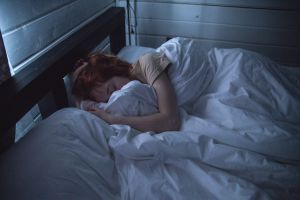 As we finish up the 5th week of the UK lockdown to combat the spread of coronavirus, many of us are noticing that the quality of our sleep isn’t the same as usual. On social media the hashtag #cantsleep is trending and many people are reporting having vivid dreams, often bordering on nightmares.
As we finish up the 5th week of the UK lockdown to combat the spread of coronavirus, many of us are noticing that the quality of our sleep isn’t the same as usual. On social media the hashtag #cantsleep is trending and many people are reporting having vivid dreams, often bordering on nightmares.
The changes in our sleep are a natural response to changes in our activities and environments. As a whole, we are moving less, eating differently (hello lockdown chocolate and crisp snacking!), and worrying more. However, not sleeping well can become an issue because when we are tired we tend to make poorer decisions, we worry more and have higher levels of anxiety and are more inclined to reach for pick-me-up hits of sugar and caffeine to keep us going. All of which starts to create a cycle where we get poorer and poorer sleep.
By now most of us are starting to find something that resembles a routine. For people still working either from home or out in the community and for parents, this routine is possibly more structured than the rest of us. Routines are crucial in our wellbeing as humans, having a solid routine can help not only our mental health, but also our physical health. Even if your life has changed recently, it’s still important to preserve your usual sleep and waking times. Having this familiar routine can actually help you sleep better even if you aren’t using up as much energy.
Maintaining exercise routines or adding in extra movement can also be beneficial if you’re struggling to sleep. Right now many of us are moving less than we ever did before, taking seriously the advice to stay at home unless absolutely necessary. Add exercise back in, whether it’s getting creative with body weight exercises at home, taking an online dance class or going for a jog or a bike ride in the sun. Research shows that exercise levels in line with World Health Organisation recommendations for cardiovascular health (that is, at least 30 minutes of moderate activity per day at least five time per week) can also improve mood and sleep quality.
Getting out and about during the day and exposing yourself to more daylight is also helpful in resetting your sleep patterns back to their norm.
While it’s normal and to be expected that sleeping patterns and habits will shift in times of stress and change, it’s important to take steps to change the pattern before it becomes a habit. If you were to ask a doctor what they’d recommend for poor sleep they may prescribe a range of different interventions including hypnotherapy. “Hypnotherapy and hypnosis can help us overcome patterns of sleep disturbance” says the National Council for Hypnotherapy. This can include teaching you stress reduction tools, sleep hygiene and finding and removing the causes of anxiety and worry that may be the cause for your poor sleep.
Need help in sleeping? Find a hypnotherapist near you by using the NCH’s directory.
